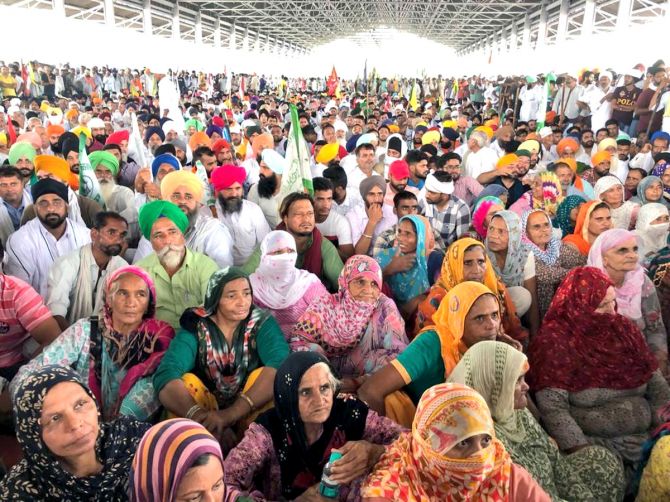'Nehru wanted to strengthen industries by exploiting agriculture and that policy was continued by successive governments.'

Shetkari Sanghatana President Anil J Ghanwat, a member of the Supreme Court appointed committee to examine the Centre's three farm laws, has urged the apex court to release the committee's report in the public domain and forward it to the Centre.
Ever since the Modi government passed the three farm laws in Parliament and enacted the Farmers Produce Trade and Commerce Act, farmers in western Uttar Pradesh, Punjab and Haryana have been on the streets protesting and demanding withdrawal of the laws.
On January 12, the Supreme Court stayed these laws and set up the three-member committee, of which Ghanawat is a member, and told them to come out with a report. The other two members are Ashok Gulati and Pramod Joshi.
After meeting almost 100 farmers groups, the panel submitted its report to the apex court on March 19, where it has remained since then.
Syed Firdaus Ashraf/Rediff.com spoke to Anil J Ghanwat about the continuing standoff over the farm laws, and what should be done to improve the standard of living of farmers.
How will your report solve the long stalemate between the Union government and farmers over the three farm laws?
What is necessary for improving the standard of living of farmers are reforms. And the recommendations and suggestions were given by people who participated (before our panel).
According to their suggestions we feel this report (when released) will help the farmers of our country and will be good for the consumers too.
Did your committee meet any of the farmers organisations which are opposing these three farm laws?
No. We requested them many times to come and meet us, but they did not come. We also sent WhatsApp messages to them, but they did not respond to that too.
I, myself, called some of my old friends who are protesting outside Delhi's borders, but they told me that I must quit the committee first. They refused to talk, and what could we do when someone is not ready to talk to us?
When your committee was formed, at that time the opposing farmer leaders said that all three of you were very pro-government and pro-farm laws and they did not expect justice from you.
Definitely. This committee was appointed by the Supreme Court of India. We did not apply for this post to the Supreme Court of India. The Supreme Court thought we are good for this committee so we were appointed.
We are pro-reforms and this was never a hidden fact. We have been advocating this for the last 40 years. And this government has taken a baby step towards liberating agriculture. Therefore, we supported the three farm laws, but we did not support it completely.
We had concerns about the legal procedure written in the laws, also about the Essential Commodities Act and some trifle issues that needed to be corrected.
Nobody should believe that we are supporting these farm laws completely. We have been advocating farm reforms for the last 40 years and it is only now that this government has come to support our views.
You may recall Sharad Joshi, the late stalwart leader of farmers, had been talking about the farmers cause for the last 40 years.
Two main contention of the farmers unions -- an assurance that MSP will not go and that APMC markets won't be dismantled --- were not mentioned in these farm laws. Does your recommendation talk about these things?
I won't speak about our recommendations as they are confidential.
Before my nomination to this committee, I have mentioned in various newspaper articles that MSP is not mentioned in this law so MSP is not going.
Secondly, closing down the APMC is also not mentioned, therefore that is also not going.
The government just wants more options for farmers to sell.
Existing laws say a farmer should sell his goods only to the APMC and sell his goods to licensed traders. The limited number of buyers puts the buyers in a better position to exploit the farmers.
Now, if licences are not required, then anybody can come and buy goods from farmers. They can come to their field and buy goods from the farmers directly from his or her farm. This is called as free trade.
Any other producer of commodity in India, be it pen or notebook, can sell his goods anywhere in India, so why should farmers not be allowed to do that?
Bihar scrapped the APMC in 2006 and the protestors from Punjab and Haryana say Bihar farmers come to work as farm labour in their state since the APMC has collapsed. They don't want to end up as farm labour, too, the protestors say.
You journalists must go to Bihar and find out about the state of Bihar's farmers.
But Punjab and Haryana's farmers say Bihar farmers come as labourers to work in their state.
Bihar farmers are going to the fields of Punjab and working there as labourers for decades. It is nothing new. It is not because of the dismantling of the APMC in 2006.
If Bihar farmers get better markets and reforms, they will not go to Punjab.
This (crisis) is the consequence of the policies adopted by Jawaharlal Nehru. Pandit Nehru wanted to strengthen industries by exploiting agriculture and that policy was continued by successive governments. No party dared to change those policies, and this time they did because out of compulsion.
Are you really blaming Nehru for today's farm crisis?
Of course, Nehru is to be blamed for today's farm crisis. This is his policy.
You read the second five-year plan and it is clearly stated that it is not in favour of the country giving optimum price to the farmers.
It says that industries should get cheap labour from the villages and cheap raw material so the price of agriculture produce has to be low.
Many other parties after Nehru came to rule, but nobody dared to change these laws. Even Atal Bihari Vajpayee did not dare to change these laws. (Shetkari Sanghatna founder) Sharad Joshi wrote about all this in his report, but his report has been collecting dust.
Which year did the APMC Act come into existence?
It came in 1963, one year before Nehru's death. There were discussions before and the policy came out that industries should benefit by exploiting agriculture.
Now, in the last one year, though the three farm laws are suspended, is it true that APMCs are losing business to private mandis and private players?
It is not true. You go to any market in Maharashtra, they are flooded with products.
The good thing is that private APMCs are flourishing too and farmers are getting a choice. Earlier, they had a compulsion to sell only in government-run APMC but now they have a choice and multiple options.
Some companies like Big Basket have set up procurement units in villages. In private mandis, there is no tax to farmers and therefore farmers are happy.










 © 2025
© 2025